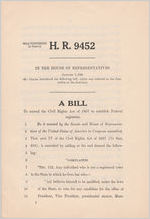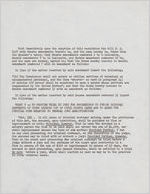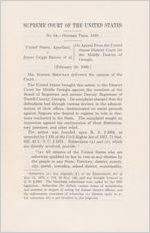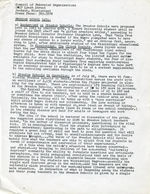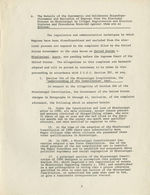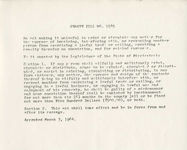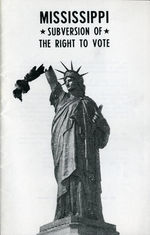Civil Rights Act of 1957
- Title:
- Civil Rights Act of 1957
- Years:
- 1957
- Description:
- On September 9, 1957, President Dwight D. Eisenhower signed into law the Civil Rights Act of 1957. Originally proposed by Attorney General Herbert Brownell, the Act marked the first occasion since Reconstruction that the federal government undertook significant legislative action to protect civil rights. Although influential southern congressman whittled down the bill's initial scope, it still included a number of important provisions for the protection of voting rights. It established the Civil Rights Division in the Justice Department, and empowered federal officials to prosecute individuals that conspired to deny or abridge another citizen's right to vote. Moreover, it also created a six-member U.S. Civil Rights Commission charged with investigating allegations of voter infringement. But, perhaps most importantly, the Civil Rights Act of 1957 signaled a growing federal commitment to the cause of civil rights.
- Archival Collections And Reference Resources:
-
48 items in 4 collections (expand all)
Box 142, Folder 3: Civil Rights, 1960-1963
- Creator:
- Whitener, Basil Lee, 1915-
- Date of Original:
- 1960/1963
- Collection:
- Basil Lee Whitener papers, 1889-1968
- Contributing Institution:
- David M. Rubenstein Rare Book & Manuscript Library
Box 142, Folder 4: Civil Rights, undated
- Creator:
- Whitener, Basil Lee, 1915-
- Date of Original:
- 1889/1968
- Collection:
- Basil Lee Whitener papers, 1889-1968
- Contributing Institution:
- David M. Rubenstein Rare Book & Manuscript Library
Box 143, Folder 1: Debate File, 1959-1960
- Creator:
- Whitener, Basil Lee, 1915-
- Date of Original:
- 1959/1960
- Collection:
- Basil Lee Whitener papers, 1889-1968
- Contributing Institution:
- David M. Rubenstein Rare Book & Manuscript Library
Allen--Freedom School mimeo materials 1963-64 (Pamela P. Allen papers, 1967-1974; Archives Main Stacks, M85-013, Folder 1)
- Creator:
- Allen, Pamela, P., 1943-
- Date of Original:
- 1967/1974
- Collection:
- Freedom Summer Digital Collection
- Contributing Institution:
- Wisconsin Historical Society
Bowie--Mississippi Freedom Democratic Party (Harry J. Bowie papers, 1964-1967; Archives Main Stacks, Mss 31 & Micro 928 (P82-2479), Box 2, Folder 3)
- Creator:
- Bowie, Harry
- Date of Original:
- 1964/1966
- Collection:
- Freedom Summer Digital Collection
- Contributing Institution:
- Wisconsin Historical Society
CORE--Freedom Day, Canton, March 13, 1964 (Congress of Racial Equality. Mississippi 4th Congressional District records, 1961-1966; Historical Society Library Microforms Room, Micro 793, Reel 2, Segment 35)
- Creator:
- Congress of Racial Equality. Mississippi Fourth Congressional District
- Date of Original:
- 1964
- Collection:
- Freedom Summer Digital Collection
- Contributing Institution:
- Wisconsin Historical Society
CORE--Mississippi Freedom Democratic Party - Memoranda and reports, 1964-1966 (Congress of Racial Equality. Mississippi 4th Congressional District records, 1961-1966; Historical Society Library Microforms Room, Micro 793, Reels 2-3, Segment 37)
- Creator:
- Congress of Racial Equality. Mississippi, Fourth Congressional District
- Date of Original:
- 1964/1966
- Collection:
- Freedom Summer Digital Collection
- Contributing Institution:
- Wisconsin Historical Society
Council of Federated Organizations Panola County Office --Legal Material, 1964-1965 (Council of Federated Organizations Panola County Office records, 1963-1965; Archives Main Stacks, Mss 521, Box 1, Folder 12)
- Creator:
- Council of Federated Organizations (U.S.). Panola County Office (Miss.)
- Date of Original:
- 1964/1965
- Collection:
- Freedom Summer Digital Collection
- Contributing Institution:
- Wisconsin Historical Society
Lipsky--Pamphlets and articles, Mississippi (Michael Lipsky and David J. Olson Papers, 1935-1981; Z: Accessions, M96-024, Box 1, Folder 4)
- Creator:
- Lipsky, Michael
- Date of Original:
- 1935/1981
- Collection:
- Freedom Summer Digital Collection
- Contributing Institution:
- Wisconsin Historical Society
Photograph of President Eisenhower signing the Civil Rights Act of 1957
- Creator:
- Naval Photographic Center (U.S.)
- Date of Original:
- 1957-09-09
- Collection:
- Presidential Timeline of the Twentieth Century Information: Dwight D. Eisenhower
- Contributing Institution:
- Dwight D. Eisenhower Library
Address by Senator Strom Thurmond (-SC) in the Senate in opposition to enactment of the so-called Civil Rights Bill, 1957 July 11
- Creator:
- Thurmond, Strom, 1902-2003
- Date of Original:
- 1957-07-11
- Collection:
- Strom Thurmond Collection, Mss 100
- Contributing Institution:
- South Carolina Digital Library
Address of Senator Strom Thurmond (D-SC) in the Senate against the compromise version of H. R. 6127, 1957 August 27
- Creator:
- Thurmond, Strom, 1902-2003
- Date of Original:
- 1957-08-27
- Collection:
- Strom Thurmond Collection, Mss 100
- Contributing Institution:
- South Carolina Digital Library
Address of Senator Strom Thurmond (D-SC) in the Senate in opposition to passage of H. R. 6127, 1957 August 6
- Creator:
- Thurmond, Strom, 1902-2003
- Date of Original:
- 1957-08-06
- Collection:
- Strom Thurmond Collection, Mss 100
- Contributing Institution:
- South Carolina Digital Library
Address of Senator Strom Thurmond (D-SC) in the Senate in opposition to the authority in the so-called Civil Rights Bill for the use of troops, 1957 July 22
- Creator:
- Thurmond, Strom, 1902-2003
- Date of Original:
- 1957-07-22
- Collection:
- Strom Thurmond Collection, Mss 100
- Contributing Institution:
- South Carolina Digital Library
Address of Senator Strom Thurmond (D-SC) in the Senate in opposition to the so-called Civil Rights Bill and advocating protection of the right of trial by jury, 1957 July 31
- Creator:
- Thurmond, Strom, 1902-2003
- Date of Original:
- 1957-07-31
- Collection:
- Strom Thurmond Collection, Mss 100
- Contributing Institution:
- South Carolina Digital Library
Excerpts from an address by Senator Strom Thurmond (D-SC) in the Senate in opposition to H. R. 6127, the so-called Civil Rights Bill, 1957 July 11
- Creator:
- Thurmond, Strom, 1902-2003
- Date of Original:
- 1957-07-11
- Collection:
- Strom Thurmond Collection, Mss 100
- Contributing Institution:
- South Carolina Digital Library
- Educator Resources:
-
1 items in 1 collections (expand all)
The Civil Rights movement: Evaluating Lyndon B. Johnson's character and efforts during the civil rights era
- Date of Original:
- 1969-04
- Collection:
- For Educators
- Contributing Institution:
- Gilder Lehrman Institute of American History
